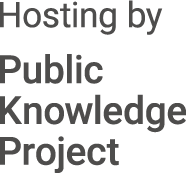Policies
Editorial Policies and Practices
Decisions on submitted manuscripts are made by Co-Editors-in-Chief and Managing Editors upon advice from Associate Editors, who are responsible for managing independent peer review. Co-Editors-in-Chief and Managing Editors may also act as Associate Editors.
Manuscript submissions are initially screened for basic quality and fit. Editors may, at that point, deem a submission a “desk reject” and notify the authors of their decision. Suitable submissions are assigned to handling editors for further assessment. Papers advanced to peer review are sent to referees. Authors and referees remain anonymous at all stages of the peer review and revision process.
Editorial team members are very occasionally asked to review manuscripts, and to encourage members of the profession to submit promising manuscripts to the journal. Editors may also invite submissions including for special topic sections. The same review system applies for all submissions.
REL strives to return high quality reviews to authors in a timely manner, with the Journal Manager regularly reviewing the status of all active submissions to eliminate unnecessary delays.
Publication Ethics
REL adheres to the Stanford University Press Publication Ethics for Journals and guidelines developed by the Committee on Publication Ethics (COPE). REL policies are guided by the COPE's Core practices and Ethics Toolkit for a Successful Editorial Office. When issues not covered in REL policies arise, editors refer to COPE resources for guidance, follow relevant COPE flowcharts, and update policies when necessary.
REL’s review process is founded on the independence of peer reviewers and editors. Editors’ judgements are considered final unless a COPE standards breach has taken place. Reasonable suspicions of research, publication, or review misconduct should be brought to the attention of the editors by email. The submission must state the breached code of conduct standard and the grounds for the concern over it. In dealing with such matters, the editors are guided by the COPE's Core Practices. The editors will seek to address and resolve all complaints and may refer them to the journal’s Advisory Board for review and action, including, if deemed necessary, seeking independent external guidance.
Authors, reviewers, and editors, who have real or perceived conflicts of interest (or competing interests) in a manuscript submission, are required to disclose the nature and extent of the interest. Reviewers and editorial team members must recuse themselves from the editorial process of the manuscript submission where conflicts of interest (or competing interests) may materially influence editorial decisions.
Copyright and Licensing
Authors retain copyright of their work and grant REL right of first publication with the work simultaneously licensed under a Creative Commons Attribution Non-commercial CC BY-NC 4.0 License. This license enables re-users to distribute, remix, adapt, and build upon the material in any medium or format for noncommercial purposes only, and only so long as attribution is given to the creator.
Post-Publication Discussions and Corrections
Editors encourage and welcome debate on the journal’s content and will consider for publication cogent criticisms of work published in REL. As well, the editors will seek to diligently publish, as required, corrections, clarifications, retractions, and apologies.
For the journal’s policies on authorship, artificial intelligence, data availability, and other manuscript requirements, see the journal’s Submission section.



